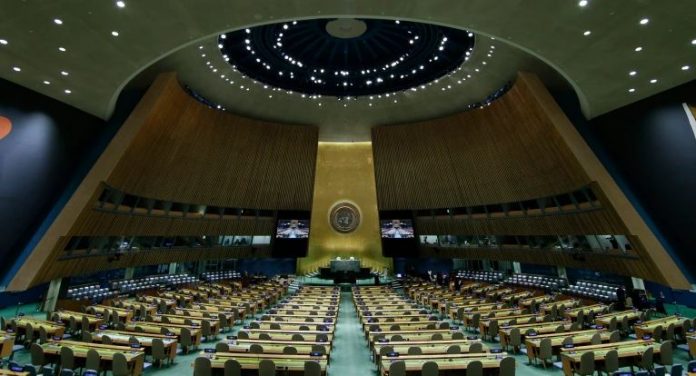NEW YORK: A committee of UN General Assembly has adopted a western draft resolution calling for a moratorium on the use of the death penalty, after overcoming opposition from a bloc of states, including Pakistan, that said it undermined their sovereignty.
The 193-member Assembly’s Third Committee — which deals with social, humanitarian and cultural issues — approved the draft resolution by a vote of 126 in favour to 37 against, with 24 abstentions. .
The draft will come up for the General Assembly’s endorsement next month.
Under the terms of the draft, the Assembly would call on States to progressively restrict use of capital punishment, ensure that it is not applied on the basis of discriminatory laws, improve conditions in detention and establish a moratorium on executions with a view to abolishing the death penalty.
Czech Republic, speaking on behalf of the European Union (EU), said that they were pushing for the draft resolution as capital punishment fails to deter criminal behaviour.
Justice systems are run by humans and are therefore exposed to mistakes and aggravated by social stigmas and political pressure, particularly in countries with no independent judiciary, the EU statement said, adding that the death penalty primarily affects poorer persons and those belonging to marginalized groups.
After several countries called the draft flawed in attempting to reinterpret existing human rights instruments, it was adopted following the approval of an amendment, which garnered 103 votes in favour to 68 against, with 13 abstentions.
The amendment affirmed, “the sovereign right of all countries to develop their own legal systems, including determining appropriate legal penalties, in accordance with their international law obligations”. Pakistan voted in favour of the amendment, but cast a negative vote on the full draft resolution. Explaining his vote, Pakistani delegate Muhammad Rashid said that while the amendment has been adopted, Pakistan does not agree with the overall framework of the draft resolution, and therefore voted against it.
Noting that there was no consensus for or against the death penalty, he said that every State has an inalienable right to decide its own laws, recalling that the International Covenant on Civil and Political rights allows for the death penalty in a manner consistent with a State’s law and judicial processes.
“Death penalty when applied in accordance with due process of law and judicial safeguards, does not infringe on any other human right,” the Pakistani delegate said, adding that right to life must be protected for the victims of horrific and most serious crimes as well.”
Pakistan’s national legislation was in line with international law, especially international human rights law, Rashid said, and the death penalty is only applied after adhering to the full due process of law, pursuant to a final judgment rendered by a competent court, and with the right to seek pardon or appeal for commutation. –Agencies




